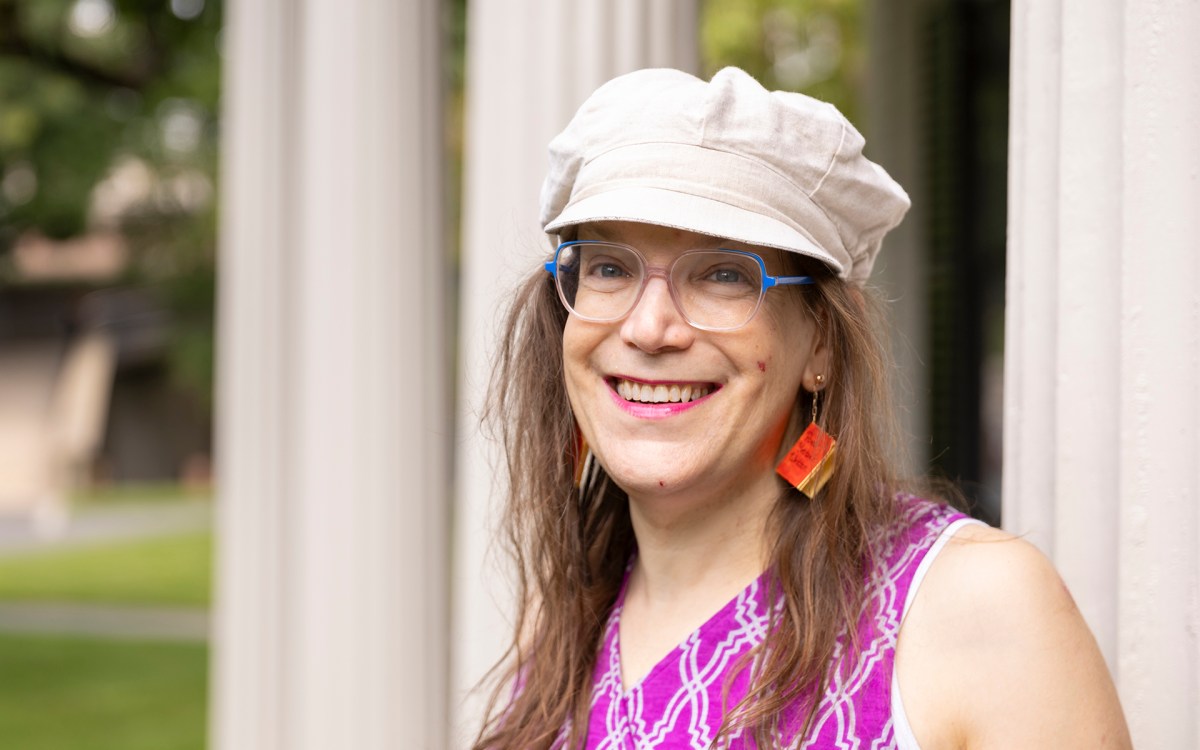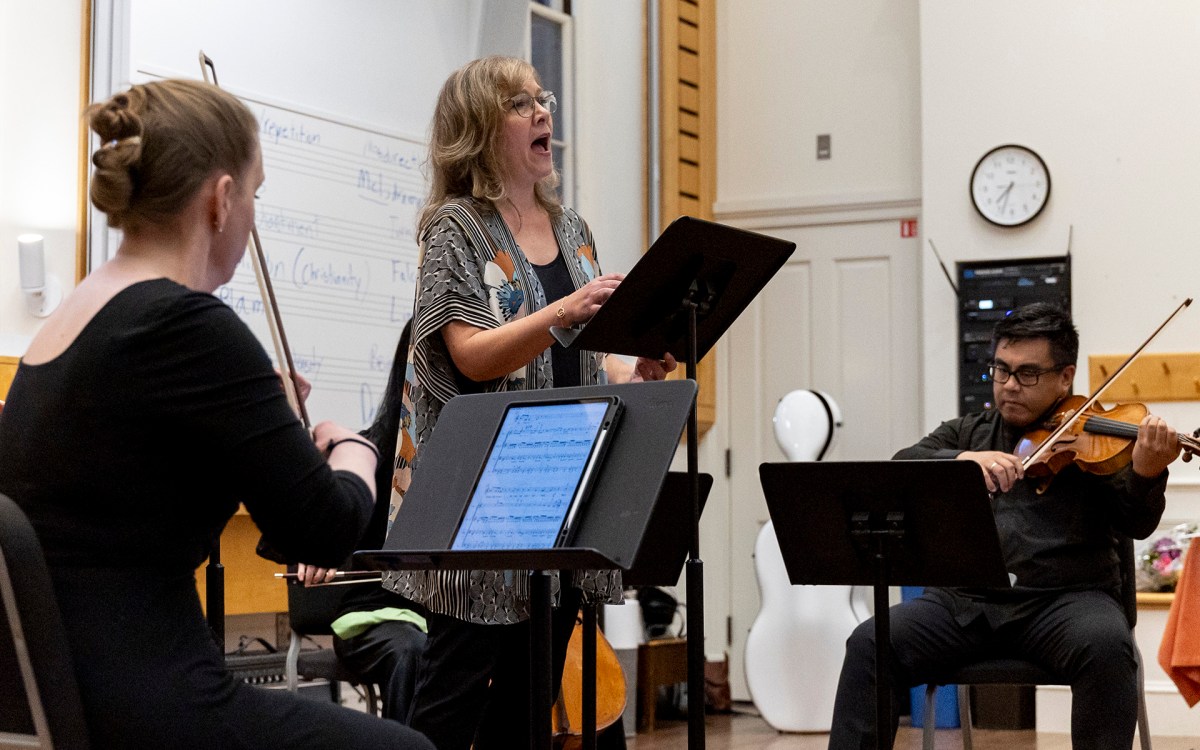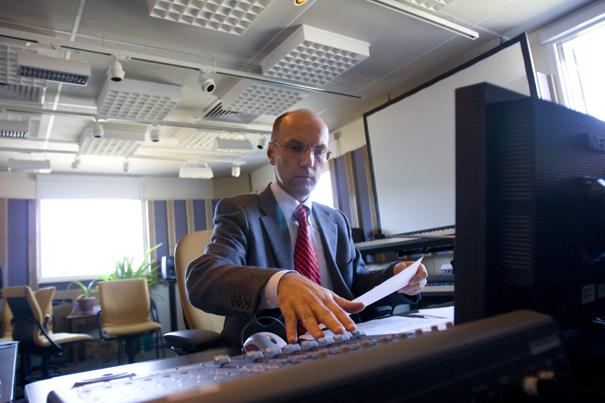Arts & Culture
-

When trash becomes a universe
Artist collective brings ‘intraterrestrial’ worlds to Peabody Museum
-

Need a good summer read?
Whether your seasonal plans include vacations or staycations, you’ll be transported if you’ve got a great book. Harvard Library staff share their faves.
-

From bad to worse
Harvard faculty recommend bios of infamous historical figures
-

From ‘joyous’ to ‘erotically engaged’ to ‘white-hot angry’
Stephanie Burt’s new anthology rounds up 51 works by queer and trans poets spanning generations
-

What good is writing anyway?
Scholars across range of disciplines weigh in on value of the activity amid rise of generative AI systems
-

Talking about music doesn’t have to be difficult
Yeats poem inspires 3 songs and deep listening, discussion at Mahindra event
-
Prolific poet John Ashbery ’49 will receive 2009 Harvard Arts Medal
Pulitzer Prize-winning poet John Ashbery ’49 will receive the 2009 Harvard Arts Medal in a ceremony kicking off the Arts First festivities on April 30.
-
Student work lights up Mass Hall corridor
These days Mass Hall’s ground-floor main corridor looks more like a contemporary art gallery than simply a prestigious passageway — and that’s exactly how University President Drew Faust likes it.
-
‘Passing’ in colonial Colombia
Radcliffe Fellow Joanne Rappaport gave a glimpse of her work last week (Feb. 4) during a talk at the Radcliffe Gymnasium, where 80 listeners were drawn in by her intriguing title: “Mischievous Lovers, Hidden Moors, and Cross-Dressers: The Meaning of Passing in Colonial Bogotá.”
-
Project on Soviet Social System goes online
or decades, the Harvard Project on the Soviet Social System (HPSSS) has been a major source of information for researchers analyzing the Soviet Union between World War I and World War II. Due to its archaic and often-confusing indexing system, though, the HPSSS has also been a source of frustration for researchers trying to comb through its 61 volumes.
-
VES film features city on the move
Maxim Pozdorovkin and Joe Bender, graduate students in Harvard’s Department of Slavic Languages and Literatures and Department of Romance Languages and Literatures, respectively, have captured Kazakhstan’s dramatic emergence in a documentary film titled “Capital.”
-
Panel of experts addresses Lincoln’s legacy
On Monday (Feb. 9), a team of experts assembled at Harvard’s John F. Kennedy School of Government (HKS) to examine the history and profound impact of the tall, awkward, self-taught man from rural Kentucky who is credited with bringing about an end to slavery and saving the nation’s cherished founding principle of democratic rule.
-
‘Passion for the Arts’ translates into action
Harvard University is taking the first steps recommended in December by its Arts Task Force, including finding more gallery space in existing buildings and creating a Web portal that will ease access to seeing, hearing, and learning the arts in practice.
-
Rubén Blades donates papers, recordings
He’s attained fame as an award-winning actor and musician, founded a political party and run for president of his native Panama and served as the Panamanian minister of tourism, but now Rubén Blades LL.M. ’85 will add another credit to his resume: Harvard College Library benefactor.
-
Du Bois exhibit a first in U.S.
The images on the walls of the intimate gallery at 104 Mt. Auburn St. are hauntingly evocative. In “Black Friar,” a hooded figure stares out of the darkness, his gaze intense and unsettled. An opposing image, “Every Moment Counts,” offers a modern approach to Jesus, as a beloved disciple leans against the body of the Christ-like figure whose eyes are fixed on the heavens.
-
Du Bois Institute gives Houghton Library Masonic certificate
The W.E.B. Du Bois Institute at Harvard University recently gave a Masonic membership certificate signed by Prince Hall, a minister, abolitionist, and civil rights activist known as the father of Black Freemasonry in the United States, to Houghton Library.
-
Innovative filmmaking marks VES program
An intimate relationship between the residents of Harbin city in northeastern China and their mother river, the Songhua. A revealing insight into the personal struggles and national identity of Sudanese potters on the banks of the White Nile. These are the subjects of two ethnographic films premiering Feb. 11 at the Peabody Museum of Archaeology and Ethnography.
-
Vivid scrolls from Japan tell timeless stories
For nearly a decade, Melissa McCormick, John L. Loeb Associate Professor of the Humanities, has been absorbed in the study of elaborate works of fiction. The themes she encounters — love, temptation, even family drama — are timeless. The format — narrow horizontal scrolls of mulberry paper, with hand-painted images and columns of calligraphy — places her project squarely in late medieval Japan.
-
Houghton to host four major symposia
The year 2009 marks the 200th anniversary of the birth of Abraham Lincoln, the 100th anniversary of the founding of the Ballets Russes, the 150th anniversary of the birth of Sir Arthur Conan Doyle, and the 300th anniversary of the birth of Samuel Johnson — and all four will be celebrated at Houghton Library.
-
A visit with musician Hans Tutschku
Up in the eaves of Paine Music Hall, professor of music Hans Tutschku is hard at work composing in a setting that would make Mozart’s head spin. The space is small but packed with equipment: computer monitors, eight loudspeakers, a turntable, and several mixers and synthesizers with enough levers to land a 747.

-
Isolating creativity in the brain
How — exactly — does improvisation happen? What’s involved when a musician sits down at the piano and plays flurries of notes in a free fall, without a score, without knowing much about what will happen moment to moment? Is it possible to find the sources of a creative process?
-
‘Nation-shaking’ racial, ethnic changes
Real earthquakes are slow to build and fast to erupt. Other, metaphorical, quakes, can follow the same pattern — and be just as earthshaking.
-
Scholar asks: ‘How can we know the spectator from the dance?’
When Yvonne Rainer and her fellow dancers took to the stage in the early 1960s, their performances were like nothing American audiences had ever seen. First, there were no costumes. Performers wore T-shirts, casual pants, and sneakers. In place of elaborate leaps and twirls, the dancers engaged in everyday movements like running, climbing, and even falling. And there was little to no emotional drama. The focus was on the body: unadorned, physical, and pure. Rainer — choreographer, dancer, and visionary — had sparked a revolution.
-
Seidel honored with Crystal Quill Award
Steve Seidel, the Patricia Bauman Arts in Education professor at the Harvard Graduate School of Education (HGSE), received the Crystal Quill Award from the Shakespeare Festival/LA Nov. 20 in Los Angeles. The Shakespeare Festival/LA is an arts organization that uses professional theater traditions to “enchant, enrich, and build community.”
-
Author McGowan is honored as ‘2008 Harvard Humanist of the Year’
Can parents raise moral children without religion? Greg Epstein M.T.S. ’07 thinks so. He’s the Humanist chaplain at Harvard, and has just finished writing a book due out next fall. Its title: “Good Without God.”
-
Class, war, and discrimination in 1812 Korea
Sun Joo Kim’s laugh is as easy as it is infectious. Her cheery nature no doubt comes in handy when she’s conducting her intensive research in three complex languages.
-
‘The health of poetry’
As a graduate student at Oxford, Gwyneth Lewis wrote her dissertation on 18th century literary forgery. But as a working poet for three decades — and this year as a Radcliffe Fellow — she is as far from that fraud as conceivable.
-
Patricia Cornwell endows conservationist at Straus Center
Harvard Art Museum announced the establishment of the Patricia Cornwell Conservation Scientist position at the museum’s Straus Center for Conservation and Technical Studies. Funded by a $1 million commitment from best-selling author Patricia Cornwell, the Cornwell Conservation Scientist will play a key role in the analytical laboratory and beyond.
-
At GSD, UPenn’s Thomas Sugrue talks about ‘civil rights and the metropolis’
For the first time in a generation, urban policy is back on the national agenda. Advocates for the nation’s cities have been thrilled by the announcement that the Obama administration will include a White House Office of Urban Policy.
-
Achebe celebrates African literature with poetry
Chinua Achebe, the esteemed Nigerian novelist and poet, delivered this year’s Distinguished African Studies Lecture at the Center for Government and International Studies (CGIS). Greeting the standing-room-only crowd in Tsai Auditorium earlier this week (Nov. 17), Achebe surprised the group by announcing that he had an unusual program in mind.
-
‘Godot’ in the bayou: Artist Chan speaks at Carpenter Center
Paul Chan is soft-spoken, but his words are heavy. Carefully chosen, they offer an insight into his reflective process and the weighty implications of his work.
-
Marla Frederick talks about faith, God, and money
Not long ago, Harvard cultural anthropologist Marla Frederick sat on a wooden bench in a slum of Kingston, Jamaica. She was interviewing local churchgoers about the Christian “prosperity gospel” often promoted by American televangelists. It offers up a simple (and controversial) idea: The more you give, the more you receive.
-
Poetry, music, death take the stage at New College Theatre
John Adams ’69, A.M. ’72 returned to Harvard on Nov. 17, where he attended a performance of his piece by Harvard’s Bach Society Orchestra (a group he led in the 1960s) at the New College Theatre.
-
Appreciating Billie Jean King’s contribution to second-wave feminism
In a stately room in the Barker Center, flanked by portraits of famous men, Billie Jean King holds court. Not physically. She’s the topic of discussion, the name on everyone’s lips. One would think this were the after party of her notorious 1973 “Battle of the Sexes” tennis match with Bobby Riggs, the match she won and changed the face of women’s sports — and feminism — forever.
-
Probing an unlikely friendship
Theirs was an unlikely friendship. One man was a black abolitionist, orator, and journalist who had been a slave from Maryland, the other a white politician from the backwoods of Kentucky, Indiana, and Illinois.
-
Falling in love with South Asian music
As a young boy, Richard Wolf, professor of music, liked to sit at the piano in his grandparents’ home and invent short musical ditties. “My grandfather would listen and shout, ‘Oh! It’s Bach! Oh, just like Mozart!’” Wolf recalled recently, with a laugh. “He was wonderfully encouraging.”


